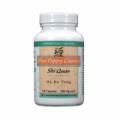Shi Quan Da Bu Tang
120 capsules x 5000mg. from Blue Poppy Classics
Indications:
Lassitude, low appetite, pale face, palpitations, insomnia, dizziness and intolerance to cold, debility after illness, childbirth and surgery, anemia, leukemia, menopausal syndrome, beriberi, poliomyelitis, chronic ulcers or prolonged healing of wounds, skin ailments, auricular ailments, etc.
TCM Functions: Supplements the qi and nourishes the blood
Indications: Qi and Blood Deficiency in consumptive disorders.
Formula explanation: Within this formula, Huang Qi, Ren Shen, Bai Zhu, Fu Ling, mix-fried Gan Cao, Sheng Jiang, and Da Zao fortify the spleen and supplement the qi, while Shu Di, Dang Gui, Bai Shao, and Chuan Xiong nourish the blood. Rou Gui warms the channels and scatters cold. However, in this formula, it strengthens and promotes the supplementation of the spleen, the latter heaven root of the engenderment and transformation of the qi and blood.
Clinical Studies:
Chronic atrophic gastritis: Modified Shi Quan Da Bu Tang was used to treat 54 patients of chronic atrophic gastritis with good success. The herbs were administered in decoction twice daily in the morning and at night. The treatment period was six months for one course of treatment. The overall effectiveness rate was 98.15 percent.1
Gastric prolapse: Concurrent treatment using acupuncture and herbs was found to be very effective in the treatment of gastric prolapse characterized by deficiencies of qi and blood with zhong (central) qi collapse. The treatment protocol for herbs was to administer Shi Quan Da Bu Tang for a total of 70 doses. Out of 15 patients, the study reported complete recovery in four patients, improvement in 10, and no benefit for one.2
Post-surgical recovery: Administration of Shi Quan Da Bu Tang has marked beneficial effects on gastric cancer patients during the postoperative recovery by improving interleukin-2 reactivity, natural killer (NK) activity, nutritional index and bone mineral indices.3
Cancer: According to one report that screened and evaluated 116 herbal formulas for treatment of cancer, Shi Quan Da Bu Tang was determined to be the most effective. Clinical benefits of Shi Quan Da Bu Tang included extremely low toxicity, self-regulatory and synergistic actions of its components in immuno-modulatory and immuno-potentiating effects, enhanced therapeutic activity in chemotherapy and radiotherapy, inhibited recurrence of malignancies, prolonged survival and reduced adverse toxicities of many anticancer drugs.4
Anemia: Administration of Shi Quan Da Bu Tang effectively increased hemoglobin, red blood cells and platelets in 41 patients with post-surgical proteinemia.5
Meniere's syndrome: In one study, 27 patients with Meniere's syndrome were treated with modified Shi Quan Da Bu Tang, with good results. The herbs were administered in a decoction once daily, for a total of six to 24 doses. Out of 27 patients, the study reported recovery in 23 patients (asymptomatic with no recurrences for six months), a marked effect in three patients and no benefit for one patient.
Ingredients:
Huang Qi (Radix Astragali)
Shu Di (Radix Rehmanniae)
Ren Shen (Radix Ginseng)
Bai Zhu (Rhizoma Atractylodis Macrocephalae)
Fu Ling (Poria)
Dang Gui (Radix Angelicae Sinensis)
Bai Shao (Radix Paeoniae Albae)
Da Zao (Fructus Jujubae)
Chuan Xiong (Rhizoma Chuanxiong)
Gan Cao (Radix Glycyrrhizae)
Sheng Jiang (Rhizoma Zingiberis)
Rou Gui (Cortex Cinnamomi)
Dosage:
2 - 3 capsules, 2 times a day
Package:
120 capsules x 5000mg. (500mg. x 10:1 concentration ratio)
Note: All Blue Poppy brand products come with the manufacturing date marked (MFG or Manuf. Date), the expiration date is 5 years from the date indicated on the bottom or side of the packaging.

